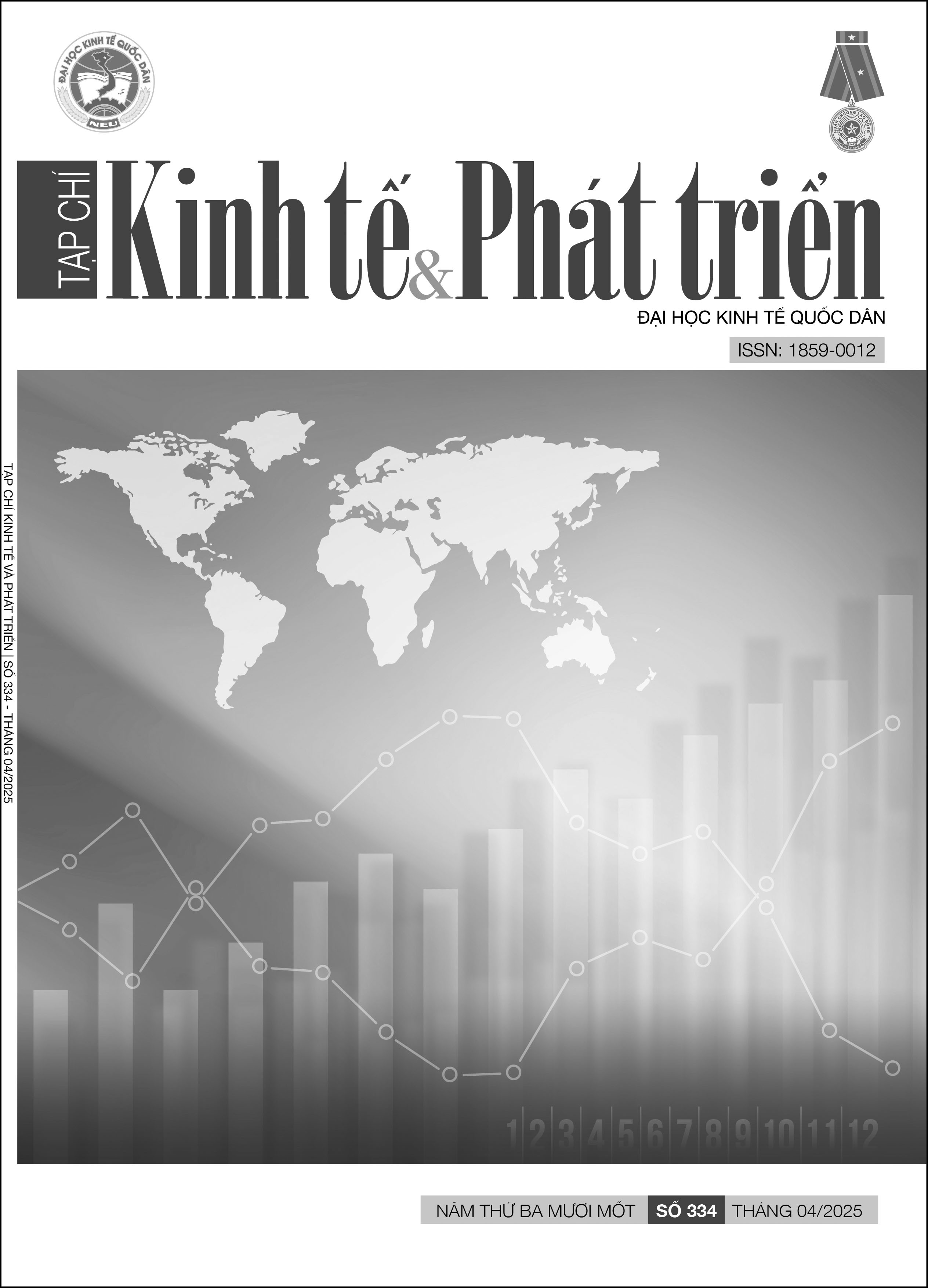Hành vi đối xử bất công của khách hàng và việc kiểm soát cảm xúc của nhân viên
DOI:
https://doi.org/10.33301/JED.VI.1922Từ khóa:
Cảm xúc bực mình, đánh giá lại nhận thức về cảm xúc, hành vi đối xử bất công của khách hàng, kiểm soát cảm xúc, kìm chế cảm xúc, trí tuệ cảm xúcTóm tắt
Trong quá trình cung cấp dịch vụ, sự tương tác giữa khách hàng và nhân viên ảnh hưởng tới chất lượng dịch vụ. Mặc dù một số nghiên cứu trước đây cũng đã xem xét ảnh hưởng của hành vi khách hàng đến cảm xúc và việc kiểm soát cảm xúc của nhân viên, tuy nhiên, chưa có nghiên cứu nào phân tích vấn đề này với tác động của biến trí tuệ cảm xúc như một biến tương tác trong mối quan hệ này. Nghiên cứu này phân tích ảnh hưởng của hành vi đối xử bất công của khách hàng đến việc kiểm soát cảm xúc của nhân viên trong mối quan hệ với biến tương tác là trí tuệ cảm xúc. Kết quả nghiên cứu chỉ ra, cảm xúc bực mình là biến trung gian truyền tải ảnh hưởng của hành vi đối xử bất công của khách hàng đến việc kiểm soát cảm xúc của nhân viên. Kết quả nghiên cứu cũng đưa ra một số gợi ý về quản lý để giúp cho các hãng dịch vụ quản lý tốt hơn chất lượng dịch vụ của mình.
Tài liệu tham khảo
Anderson, J. C. and D. W. Gerbing (1988), ‘Structural Equation Modelling in Practice: A Review and Recommended Two-Step Approach’, Psychological Bulletin, 103, 411-423.
Bagozzi, R. P. (1992), ‘The self-regulation of attitudes, intentions, and behavior’, Social Psychology Quarterly, 55(2), 178–204.
Baron, R. M., & Kenny, D. A. (1986), ‘The moderator-mediator variable distinction in social psychological research: Conceptual, strategic and statistical considerations’, Journal of Personality and Social Psychology, 51, 1173-1182.
Brotheridge, C. M., & Lee, R. T. (2003), ‘Development and validation of the emotional labour scale’, Journal of Occupational and Organizational Psychology, 76, 365-379.
Chebat, J. C. & W. Slusarczyk (2005), ‘How Emotions Mediate the Effects of Perceived Justice on Loyalty in Service Recovery Situations: An Empirical Study’, Journal of Business Research, 58, 664– 673.
Colquitt, J. A. (2001), ‘On the Dimensionality of Organizational Justice: A Construct Validation of a Measure’, Journal of Applied Psychology, 6 (3), 386-400.
Gabbott, M., Y. Tsarenko, and W. H. Mok (2010), ‘Emotional Intelligence as a Moderator of Coping Strategies and Service Outcomes in Circumstances of Service Failure’, Journal of Service Research, 14 (2) 234-248.
Gong, L., Lopa, J. M., Zhang, S. (2020), ‘The Effects of Customer Interactional Injustice on Hotel Employees’ Emotion Regulation: Case Study of an Upscale Shanghai Hotel’, Journal of Quality Assurance in Hospitality & Tourism, 22(4), 1-29.
Grandey, A. A, & Melloy, R. C. (2017), ‘The state of the heart: emotional labor as emotion regulation reviewed and revised’, Journal of Occupational Health Psychology, 22(3), 407–422.
Grandey, A. A. (2003), ‘When the show must go on: Surface and deep acting as predictors of emotional exhaustion and service delivery’, Academy of Management Journal, 46(1), 86–96.
Gross, J. J. & O. John (2003), ‘Individual Differences in Two Emotion-Regulation Processes: Implications for Affect, Relationships, and Well-being’, Journal of Personality and Social Psychology, 85, 348-362.
Gross, J. J. & R. W. Levenson (1993), ‘Emotional Suppression: Physiology, Self-Report, and Expressive Behavior’, Journal of Personality and Social Psychology, 64, 970-986.
Gross, J. J. (1998), ‘The Emerging Field of Emotion Regulation: An Intergrative Review’, Review of General Psychology, 2 (3), 271-299.
Hair, J. F., W. C. Black, B. J Babin, & R. E. Anderson (2011), Multivariate Data Analysis A Global Perspective, Seventh Edition. Pearson Prentice Hall.
Hayes, F. A. (2022), Introduction to Mediation, Moderation, and Conditional Process Analysis, Third Edition, A Regression-Based Approach, ISBN 9781462549030.
Judge, T. A. & Colquitt A. J. (2004), ‘Organizational Justice and Stress: The Mediating Role of Work–Family Conflict’, Journal of Applied Psychology, 89(3), 395-404.
Kidwell B., D. M. Hardesty, & T. L. Childers (2008), ‘Emotional Calibration Effects on Consumer Choice’, Journal of Consumer Research, 35, 611-621.
Koole, S. L. (2009), ‘The Psychology of Emotion Regulation: An Integrative Review’, Cognition and Emotion, 23 (1), 4-41.
Richards, J. M. & J. J. Gross (2000), ‘Emotion Regulation and Memory: The Cognitive Costs of Keeping One’s Cool’, Journal of Personality and Social Psychology, 79, 410-424.
Rupp, D. E. & Sharmin Spencer (2006), ‘When Customers Lash Out: The Effects of Customer Interactional Injustice, on Emotional Labor and the Mediating Role of Discrete Emotions’, Journal of Applied Psychology, 91 (4), 971–978.
Strizhakova, Y. & Y. Tsarenko (2010), ‘Consumer Response to Service Failures: The Role of Emotional Intelligence and Coping’, Advances in Consumer Research, 37, 304-311.
Tsarenko, Y., & Strizhakova, Y. (2013), ‘Coping with service failures: The role of emotional intelligence, self‐efficacy and intention to complain’, European Journal of Marketing, 47(1/2), 71–92.
Weiss, H. M., K. Suckow, & R. Cropanzano (1999), ‘Effects of Justice Conditions on Discrete Emotions’, Journal of Applied Psychology, 84, 786–794.





